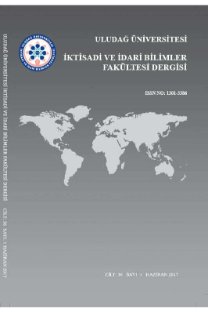Siber Uzayda Bit Vergisi Üzerine
İletişim ve bilgisayar teknolojilerinde yaşanan gelişmeler, sayısal biçime dönüştürülmüş ticari işlemler için gerekli bilgi ve belgelerin elektronik ortama aktarılmasına olanak sağlamış ve bu durum "e-ticaret" hacminin giderek artmasına yol açmıştır. E-ticarete konu işlemlerin vergilendirilmesi konusunda iki farklı öneri mevcuttur. Bu öneriler: "elektronik ortamda transfer edilen bilginin hacmi esas alınarak vergileme yapılması şeklinde önerilen Bit Vergisi" ve "internet ortamının bir serbest ticaret alam olarak kabul edilip, bu alanın her türlü vergiden arındırılması" dır. Bu çalışmada, özellikle siber uzayda Bit Vergisi'nin uygulanabilirliği konusunda tartışmalar genel bir yaklaşımla sunulmaktadır.
The latest breakthrouhgs in communication and computer technologies make it possible to transfer all of the necessary information and documents to electronic environments. Thus, electronic trade has received increasing attention and volume. There have been two different views on the issue of taxation of electronic trade. The first one, taxation should be based on the volume of transfered information. The other view claims that all trade realized on the internet should not be taxed. This study discusses the certain aspects of applicability of taxation in the cyberspace.
___
Aktan, Coşkun C. (2003). "İnsanın Doğası, Mülkiyet ve İsraf Üzerine Bazı Gerçekler", _____http://www.canaktan.org/canaktan_personal/canaktan-arastirmalari/toplam-kalite/aktan-insanin-dogasi.pdf>, (22.09.2003).Asbill, Brennan & Partner, Sutherland (1998). "Internet Taxation-State Taxation of Electronic Commerce-State Taxation of Electronic Commerce", _____http://www.netcaucus.org/events/1998/taxation/electcom.shtml>, (2.09.2003).
Bangemann, Martin (2004). "Bangemann says 'nein' to Bit Tax", _____http://www.pjb.co.uk/12/tax.htm>, (10.03.2004).
Cordell, Arthur J. (1996). "New Taxes for a New Economy", Government Information in Canada, Volume 2, Number 4 (Spring), _____ http://www.usask.ca/library/gic/v2n4/cordell/cordell.html>, (4.09.2003).
Gibson, William. (1984). "Study Guide for William Gibson: Neuromancer (1984)", _____http://www.wsu.edu:8080/~brians/science_fiction/neuromancer.html>, (21.09.2003).
Hardy, Michael & Horner, Frances. (1999). "Billabongs, Dugongs, Internet and Tax", The OECD Observer, Jan 1999, _____http://www.wsu.edu:8080/~brians/science_fiction/neuromancer.html>, (4.09.2003).
International Communications Round Table. (1997). "International Communications Round Table Position Paper on the Bit Tax", _____http://www.icrt.org/pos_papers/l 997/970704JECJT&T 1 .pdf>, (3.09.2003).
Maibach, Michael C. (1999). "The Internet: The Great Equalizer", Economic Reform Today, Number 2, 1999.
New Yok Law School. (2003). "Internet Tax Freedom _____http://www.nyls.edu/cmc/uslaws/hr3529.htm>, (2.09.2003).
Seminerio, Maria (1999), "UN 'bit tax' proposal draws fire", _____http://zdnet.com.com/2102-ll-515159.html>, (15.03.2004).
Soete, Luc & Kamp, Karin. (1996). "The Bit Tax: the Case For Further Research" _____http://econpapers.hhs.se/paper/dgrumamer/1996012.htm>, (1.09.2003).
Tanzi, Vito. (2001). "Globalization and the Work of Fiscal Termites", Finance and Development, March 2001, Volume 38, Number 1, _____http://www.imf.org/external/pubs/ft/fandd/2001/03/tanzi.htm>, (11.03.2004).
The Economist. (2000). "What The Internet Can Not Do", Aug 19th 2000.
The Economist. (2000a), "Survey on E-Commerce: Shopping Around the Web," February 26.
The Federation of Electronics Industry (FEI). (1996). "FEI Position Paper on The BIT Tax Proposal (Ref ICT/96/1564) (27/11/96), _____http://www.fei.org.uk/fei/public/position/bittax.htm>, (4.09.2003).
UNDP. (1999). Human Development Report 1999, New York Oxford University Press.
Yam, Javi Tanada (2001). "The bit tax", _____http://itmatters.com.ph/column/yam_07052001 .html>, (2.09.2003).
- ISSN: 1301-3386
- Yayın Aralığı: Yılda 2 Sayı
- Başlangıç: 2018
Sayıdaki Diğer Makaleler
Bölgelerarası Gelir Eşitsizliği: Coğrafi Bölgeler Üzerine Tanımlayıcı Bir Analiz 1965-2001
Türkiye'de Reel Döviz Kuru Oynaklığı ve Bunun İhracat Üzerine Etkisi: Sektörel Bir Analiz
Çeviri Yöntemlerinin Mali Analiz Sonuçları Üzerindeki Etkisi
Küreselleşmenin Getirdiği Sorunlar ve Bu Sorunlara Çözüm Önerileri
Bölgesel Hasıla Bileşenleri ve Bölgesel Büyüme İlişkisi: Türkiye Üzerine Çok Bölgeli Bir Uygulama
Yöneticiler Üzerindeki Etkileri Açısından Stres Kaynakları ve Bir Uygulama
Hastane İşletmelerinde Maliyetleme Yaklaşımları
